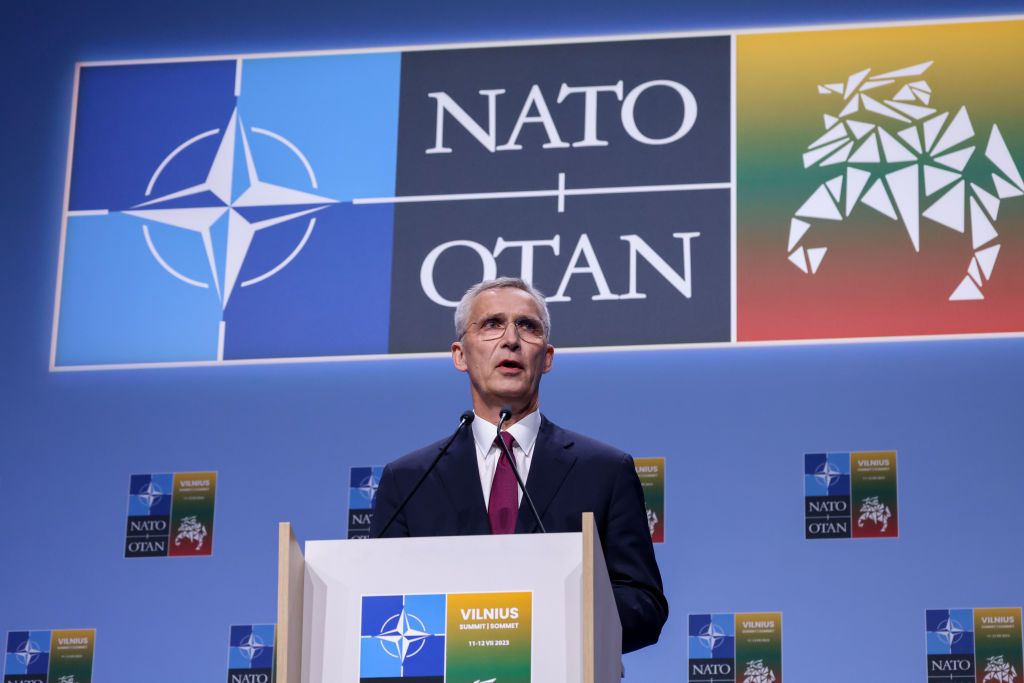Zelensky: Invitation to NATO would be 'ideal'

"The results of the summit are good, but if there was an invitation [to NATO], it would be ideal," President Volodymyr Zelensky said during a joint conference with NATO Secretary General Jens Stoltenberg in Vilnius on July 12.
"We understand that some people are afraid of talking about our membership now because nobody is willing to have a world war," he said.
"Ukraine is fighting and truly understands it can't be a member of NATO as long as the war continues on our territories, but those signals are important and we can already hear some confidence from our partners (about it)," he said.
He also defended using cluster munitions against Russia on the battlefield, assuring their use would be controlled.
"This is about justice, we defend ourselves without using appropriate weapons on the territory of other states," Zelensky said.
A White House press release from July 7 stated that the new $800 million defense aid package to Ukraine contains cluster munitions.
According to Foreign Policy magazine, cluster munitions can be fired by the 155mm artillery systems that the U.S. has already provided to Ukraine and could be very effective at clearing Russian defense lines.
The step proved controversial due to humanitarian concerns over cluster munitions. The unexploded bomblets may pose a danger to the civilian population in the area long after the hostilities end.
More than 100 countries have joined the Convention on Cluster Munitions, banning their use, production, and stockpiling. The U.S., Russia, and Ukraine are not among the signatories.
The proportion of bomblets that do not explode upon impact is called the "dud rate." According to U.S. National Security Advisor Jake Sullivan, the munitions provided to Ukraine will not have a dud rate higher than 2.5%, compared to 30-40% of cluster munitions that Russia uses in Ukraine.
Meanwhile, NATO Secretary Jens Stoltenberg defended the push for a stronger Ukraine-NATO Council as a crucial element of the package agreed on during the summit "to make sure Ukraine comes even closer to NATO and NATO membership."
"The purpose of that decision is to strengthen political ties with Ukraine," he said. "We meet as equals."
He also rebuffed Russia's constant threat over Ukraine's NATO membership. "We can never allow Moscow starts to decide who can or who cannot be a member of NATO."
Stoltenberg confirmed that a coalition of NATO countries was ready to help train Ukrainian pilots on F-16 fighter jets starting this summer.
An international coalition to train Ukrainian pilots on F-16 fighter jets has been formed, Defense Minister Oleksii Reznikov said on July 11.
At the NATO summit in Vilnius, Reznikov signed a memorandum outlining the training terms with 11 coalition members.
Those are Denmark, the Netherlands, Belgium, Canada, Luxembourg, Norway, Poland, Portugal, Romania, Sweden, and the United Kingdom.
"I'm especially grateful to Denmark and the Netherlands for their outstanding leadership in this process," the defense minister added.
According to Reznikov, Ukrainian pilots, technicians, and support staff will learn to operate and maintain F-16 jets and possibly other types of combat aircraft.
The program will start in Denmark as early as this August, and a training hub will also be set up in Romania, allies announced at the summit, Reuters reported.












